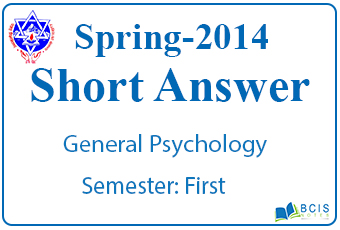
Very Short Questions Spring 2014
The answers to the Very Short Questions Spring 2014 are given below:
1. Mention any three misconceptions about psychology?
ANS- The misconceptions of psychology are given below:
- Psychology Is Easy
- Psychology Is Just Common Sense
- Psychology Isn’t a Real Science
2. What is perceptual distortion?
ANS- Perceptual distortion happens when the stated view differs from an “ordinary reaction”. This is a component of individual contrasts, for instance in perceptual style and is theoretically not the same as mental trips and optical dreams.
3. Define conformity?
ANS- Conformity is a type of social influence involving a change in belief or behavior in order to fit in with a group. This change is in response to real (involving the physical presence of others) or imagined (involving the pressure of social norms / expectations) group pressure.
4. What is an endocrine system?
ANS- The endocrine system, made up of all the body’s different hormones, regulates all biological processes in the body from conception through adulthood and into old age, including the development of the brain and nervous system, the growth and function of the reproductive system, as well as the metabolism and blood sugar levels.
5. How is memory related to the brain?
ANS- The brain simmers with activity. Different groups of neurons (nerve cells), responsible for different thoughts or perceptions, drift in and out of action. Memory is the reactivation of a specific group of neurons, formed from persistent changes in the strength of connections between neurons.
6. State the individual differences in intelligence on the basis of I.Q.
ANS- The individual differences in intelligence on the basis of I.Q are
| 130 and above | Very Superior |
|---|---|
| 120–129 | Superior |
| 110–119 | High Average |
| 90–109 | Average |
| 80–89 | Low Average |
| 70–79 | Borderline |
| 69 and below | Extremely Low |
7. Give any three causes of stress.
ANS- The causes of stress are:
- Break-up
- Death of family members
- Inability to accept uncertainty
8. Differentiate between common sense and psychology.
ANS- The most important difference between psychology and common sense is that psychology uses systematic and objective methods of observation and experimentation. Common sense on the other hand is usually played out in proverbs or short phrases, most of which are contradictory to one another.
9. What is neural impulse?
ANS- A Neural Impulse is a spike of electrical activity that travels down the length of a nervous system. For example, if you touch a hot stove, nerve cells in your fingers will fire, sending impulses through the nerves in your hand, quickly reaching your brain, which will send a signal back down to move your hand away from the heat.
10. Give two examples of a prototype.
ANS- The two examples of a prototype are a sparrow when we Nepalese are asked to remember any bird, and a cow when we are asked to remember a domestic animal.
You may also like Pokhara University || Spring,2014 || General Psychology

Leave a Reply